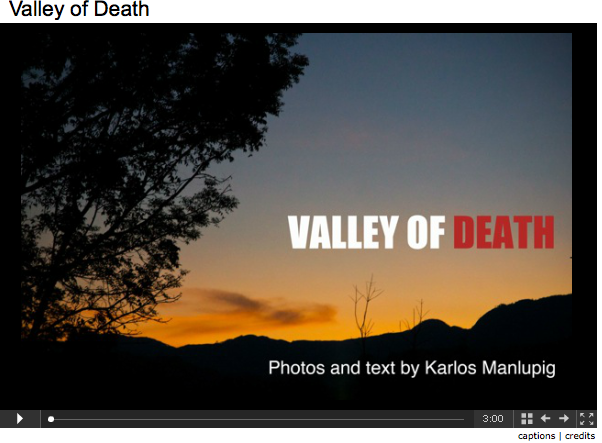By KARLOS MANLUPIG
DAVAO CITY—The frail looking Italian priest wears an indigenous bandana called tubaw and is known for speaking gently regardless of whom he is talking to: Peasants, indigenous people, or government forces in the plains and hills of North Cotabato.
Since his arrival in the Philippines in 1972, Fr. Peter Geremia has witnessed hardship and deprivation in Mindanao and has devoted his life to serving Filipinos there.
In return, he has received not only the gratitude of communities he has helped, but also death threats and the ire and suspicion of soldiers who have accused him of being a member of the communist New People’s Army (NPA).
Geremia does not take the threats and suspicion lightly. After all, two other fellow priests—Tullio Favali and Fausto Tentorio—have been murdered for their advocacies, Favali in 1985 and Tentorio just last year.
Like Geremia, the two murdered priests belonged to the Pontifical Institute for Foreign Missions (PIME), an Italian religious order that first sent missionaries to the Philippines in 1968. In Asia, PIME priests can also be found in Hong Kong, Japan, Thailand, Taiwan and Cambodia.
Three PIME priests have also been kidnapped: Father Giancarlo Bossi in Zamboanga Sibugay in 2007, Father Giuseppe Pierantoni in Zamboanga del Sur in 2001 and Father Luciano Benedetti in Zamboanga del Norte in 1998.
The PIME priests of Sultan Kudarat and North Cotabato are known for their vocal and active support for various advocacies, but this apparently does not sit well with certain sectors that consider the priests their enemies.
In 1985, Favali was brutally murdered by anti-communist paramilitary forces led by Norberto Manero Jr., also known as Kumander Bukay, in Tulunan, North Cotabato. Tentorio was shot dead inside the compound of his parish church in Arakan, also in North Cotabato.
Some 1,000 kilometers south of Manila, North Cotabato has seen poverty, landlessness and war. The province is one of the strongholds of the NPA and as well as the Moro Islamic Liberation Front (MILF).
Geremia has served in the Diocese of Kidapawan as the Diocesan Coordinator of the Tribal Filipino Program for 25 years and has been the parish priest of Columbio, Sultan Kudarat since 2010.
“Personally, I feel my missionary vocation as a call to serve the Poor, Deprived, Oppressed, Marginalized, Exploited and Struggling People (PDOMES),” Geremia wrote in PIME’s wordpress blog.
Geremia, however, worries about his security and the safety of the people in the communities.
“I was the original target of the executioners but they chanced (upon) Fr Favali and gruesomely murdered him. That happened during (then president Ferdinand) Marcos’s martial rule and we thought the killings wouldn’t happen again,” Geremia said.
But priests were not the only target of murderous elements in North Cotabato. In 2006, George and Maricel Vigo, both media practitioners and human rights advocates whom the Italian priests worked closely with, were murdered. In 2009, anti-mining activist Eliezer “Boy” Billones was killed in Koronadal, South Cotabato.
In October 17, 2011, Tentorio was shot dead inside his parish church’s premises. Known as Fr. Pops, he was recognized for his pro-poor teachings and programs, and his advocacy for environmental protection, most especially against foreign large-scale mining.
On the fourth day of the Tentorio’s wake, a peasant community in Sitio Upper Lumbo, Arakan where he worked was harassed and strafed by armed men, resulting in the death of Ramon Batoy. One of Batoy’s brothers was also injured, while another is still in jail after soldiers presented him to the media as a suspected member of the NPA. The military has insisted the strafing was an encounter between military forces and a unit of communist guerilla fighters.
After the incident, the residents immediately evacuated to the nearby public school, leaving their farmland and village a ghost town.
Geremia revealed that he is still under threat, with unidentified motorcycle-riding men still putting him under surveillance and intimidating him. These incidents, he said, were meant to create an atmosphere of fear and passivity in the community.
Geremia narrated that in a community meeting organized by the 40th Infantry Battalion headed by a certain Col. Bucu on May 21, 2006 in the town gym of Arakan, North Cotabato, he was identified as an alleged organizer of the New People’s Army and a leader of the so-called kangaroo court. He was also accused of providing logistical support to the rebels.
Geremia denied the allegations, which he likened to a death sentence.
Former Armed Forces of the Philippines Eastern Mindanao Command spokesman Col. Leopoldo Galon, Jr. said there are indeed reports from the ground about Fr. Geremia’s involvements and support to the NPA.
But Galon said the AFP sees nothing wrong with the priest’s possible logistical support to the rebels, especially dispensing medical assistance.
“It is their mission to protect and serve the area. They are here to help. In fact, we received directives from our superiors to directly engage on community peace-building and in dialogue to the different partners in the community including the priests,” said Galon.
But Geremia said that he is not putting his guard down.
“They tried to kill me. They harassed and falsely accused me. We are doing nothing wrong here. In fact, we are promoting peace by pushing for dialogues and by providing direct services to the communities wherein many of these are not reached by government services,” said Fr Geremia.
Openly denouncing the culture of impunity in the country, Geremia called for the immediate resolution of the cases of extra-judicial killings in the country, including those of PIME priests. He also called for public support for his protection and safety.
“The killing of Fr Fausto should be the last in a system of extra-judicial killings,” Geremia concluded.
![]()
(The audio slideshow was produced as part of the training course, “Thinking Beyond Stills: A multimedia course for photojournalists,” by VERA Files supported by the Canadian Embassy.)
